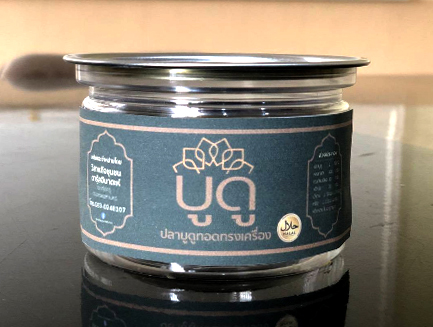Developing Budu Fish Chili Paste under the Concept of Circular Economy of Darul Ibadah Community Enterprise, Bangkok, Thailand
Main Article Content
Abstract
The Darul Ibadah Community Enterprise in Bangkok endeavored to market Budu fish chili paste, aligning it with grassroots, circular, and sufficiency economy principles. Unfortunately, this product faced multiple developmental hurdles. Challenges included issues with raw material storage, unappealing packaging, a short 1-month shelf life, absence of product labeling, inadequate machinery and facilities leading to non-compliance with FDA standards, marketing limitations, and PR struggles to generate wider awareness and promote the product. This research addressed the following key areas: 1) Collecting data on Budu fish Chili Paste quality and standards, 2) Enhancing Budu fish Chili Paste value through circular economy principles, 3) Developing and promoting business models for improved commercial competitiveness using comprehensive business and marketing plans, and 4) Enhancing grassroots economy and quality of life by upgrading production processes, acquiring machinery, expanding facilities, broadening distribution channels, and forging business networks with local and external government and private agencies. As a result, the Darul Ibadah Community Enterprise successfully crafted a unique Budu fish chili paste, reflecting local identity while demonstrating stability and growth potential. The enterprise experienced a 61% increase in monthly profits, raising monthly orders from 60 to 120 jars. Notably, fish farmers saw an average monthly income rise of 1,000 Baht (ca. 29 USD), while medicinal plant and vegetable growers enjoyed an additional 300 Baht per month (ca. 8.68 USD per month). Efficient waste management techniques, such as repurposing leftover raw materials into fish curry and biological fertilizer, achieved zero waste. These initiatives contributed to increased community income distribution, heightened environmental consciousness, and ultimately, strengthened community cohesion.
Article Details

This work is licensed under a Creative Commons Attribution-NonCommercial-NoDerivatives 4.0 International License.
Area Based Development Research Journal values copyright protection and licensing to safeguard author rights and facilitate the appropriate dissemination of research. Our policies ensure openness, accessibility, and attribution. Authors retain copyright ownership, and articles are published under a Creative Commons Attribution License (CC BY), allowing sharing, adaptation, and proper attribution. Authors have the freedom to publish under the CC BY license, granting broad reuse and distribution permissions. The journal supports posting articles on third-party repositories, adhering to institutional and funding restrictions. Author guidelines detail copyright and licensing requirements, empowering authors with knowledge about their rights and responsibilities. These policies cultivate an environment of collaboration, openness, and responsible sharing, benefiting authors and the research community while honoring intellectual property rights.
References
Center of Excellence on BCG towards Sustainable Development, Social Research Institute. (2021). The BCG handbook. Retrieved June 20, 2023, from https://online.pubhtml5.com/eeec/ttur/?fbclid=IwAR0W2pT9sysMacf-OPqF4ifX-gh3xtTuz38zUIP9no5E2VwYJ_xxFKe7ZGo#p=8. (in Thai).
Iam-Khong, N. (2022a). The development of digital transformation for improving business potential: A case study of Banbenjarong Community Enterprise in Pathumthani province. Sripatum Review of Humanities and Social Sciences Journal, 22(1), 35–48. (in Thai).
Iam-Khong, N. (2022b). Boosting competitiveness of OTOP Baan Hattasilp cloth products in Pathum Thani province through digital transformation. Area Based Development Research Journal, 15(2), 135-150. (in Thai)
Komonmarn, C. (2018). Social innovation to drive well-being through the participation of children and youth. Journal of Social Work, 26(1), 120-144. (in Thai).
Laosombat, T. (2019). Social innovation. Retrieved August 9, 2023, from: https://social.nia.or.th/2019/article0001/.
Mulgan, G., Tucker, S., Ali, R., & Sanders, B. (2007). Social innovation: What it is, why it matters and how it can be accelerated. Retrieved August 9, 2023, from: https://www.researchgate.net/publication/277873357_Social_Innovation_What_It_Is_Why_It_Matters_and_How_It_Can_Be_Accelerated .
Office of the National Economic and Social Development Council. (2017). The 12th National Economic and Social Development Plan (2017-2021) Bangkok: Office of the National Economic and Social Development Council (in Thai).
Osterwalder, A., Pigneur, Y., Oliveira, M. A. Y., & Ferreira, J. J. P. (2011). Business model generation: A handbook for visionaries, game changers and challengers. African Journal of Business Management, 5(7), 22-30.
Tupakuy, S., & Kittinaraporn, W. (2020). Circular economy management model for recycle concrete in Thailand. Proceedings of the 12th NPRU National Academic Conference, 173-180. Retrieved July 1, 2023, from https://publication.npru.ac.th/jspui/handle/123456789/848. (in Thai).


